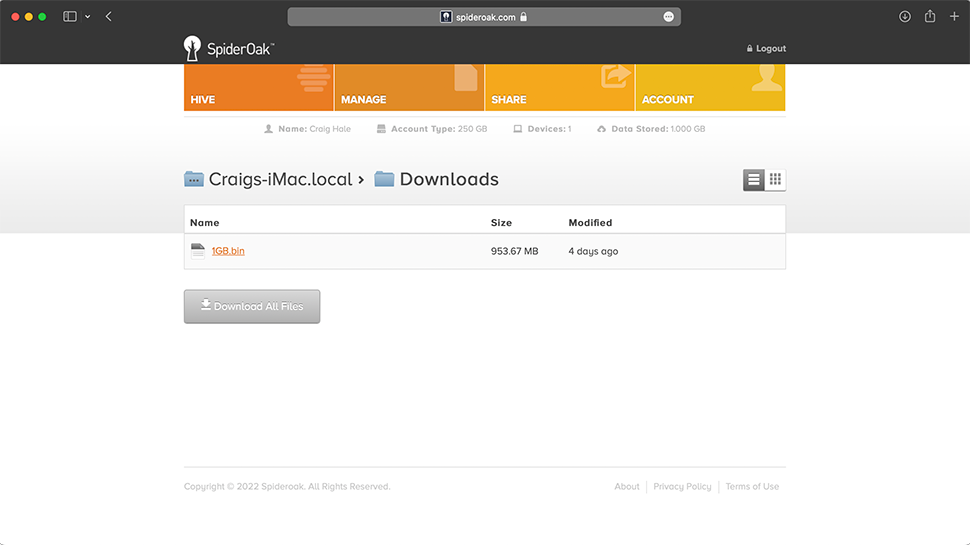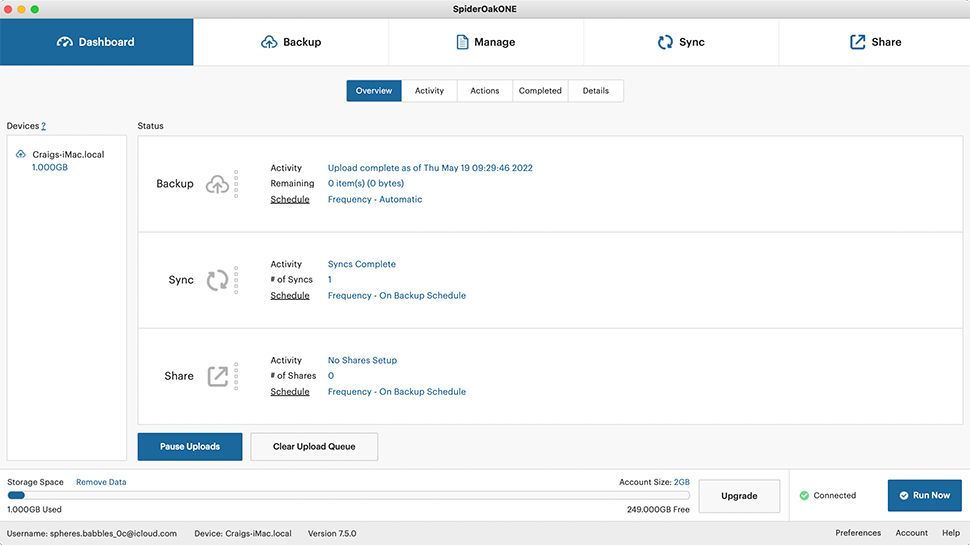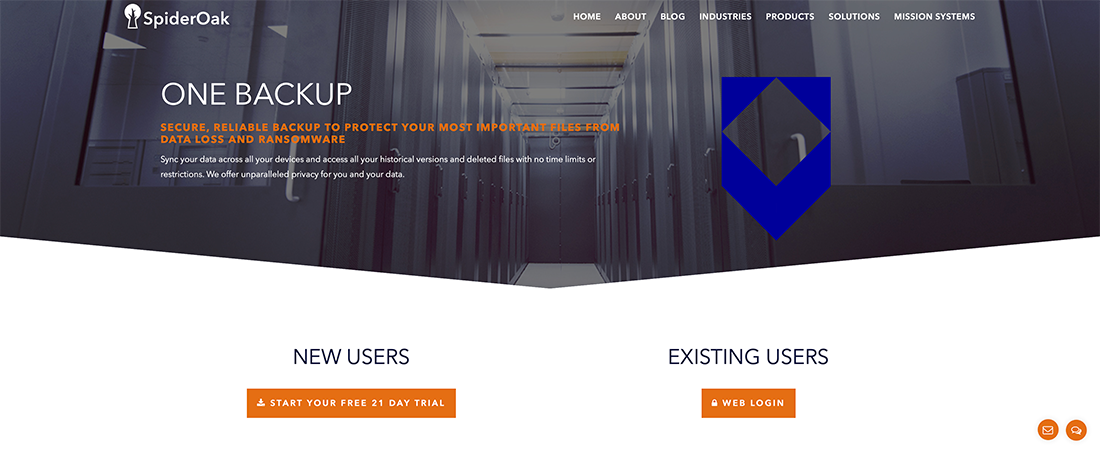TechRadar Verdict
If you've got files on computers, networked drives, and external drives to back up, sync and share across multiple devices, then SpiderOak One is a dependable option for doing just that. However, it has its weaknesses, which you should make yourself aware of.
Pros
- +
Sleek desktop client
- +
Unlimited devices
- +
Tight security protections
Cons
- -
No proper web interface
- -
On the expensive side
- -
Limited mobile support
Why you can trust TechRadar
SpiderOak and SpiderOak One have a strong reputation in the cloud storage market, and with good reason – the services come with excellent security protections and plenty of useful features. Here we're taking a particularly close look at the SpiderOak One backup plan aimed at consumers.
You can also sign up for an enterprise version of the software, which brings you everything on a greater scale, support for multiple users, centralized device management and more. It's for teams of 500 people or more, but for everyone else, SpiderOak One will do just fine.
SpiderOak One features
It would probably be quicker to talk about the features SpiderOak One doesn't have, but essentially it focuses on backing up any folders and files you've got to the cloud – whether that's data on your computer, on external drives, on USB drives, or on the local network. The number of devices you can use with SpiderOak One is unlimited, though the amount of cloud storage space isn't. The current maximum allowance for personal users is 5TB.
What SpiderOak One doesn't provide is a bare metal backup or restore, so you'll need to download and install your operating system and apps separately if something does go wrong, though this is fairly typical for most cloud backup services. SpiderOak One is perfect for syncing multiple computers as data is modified, so it's like a more advanced version of Dropbox in some ways (you can have backups run on a timer or in real time, for example, an option which Dropbox doesn't give you).
Backups are set to automatic frequency by default, however users can choose from as little as five minutes or as long as 48 hours. There’s also extra control for the time of day, which can be useful for scheduling overnight backups in order to preserve your computing power or bandwidth for more intensive tasks during the day. Like most other tools, SpiderOak One gives users the option to limit bandwidth, too.
Other sophisticated add-ons in the SpiderOak One suite include SpiderOak Hive (cloud storage for files you don't have saved locally), and a ShareRoom feature that lets your team collaborate on a folder of files via a specific web link, with its own room key and password to restrict access.
What we also liked about the way that SpiderOak functions is that all transfers are block-based, meaning that if you make changes to a large file, only those parts that have been altered get sent – this is especially useful for reducing upload times because there’s no need to include every last detail from each file. Versioning support is good too, letting you pull up older versions of a file (in fact SpiderOak One does well in every aspect of activity logging).

SpiderOak One interface
The desktop clients for SpiderOak are some of the cleanest and easiest to use that we've come across during our cloud storage testing: they're a breeze to use and make the process of picking files and folders to back up very simple. That said, there’s also heaps of control without needing to log into the browser platform. Backing up and syncing was configured in minutes and then you can just sit back and let SpiderOak get on with it.
The main interface is split up to cover backing up, syncing, your devices, and file and folder sharing. If you don't want to pick out specific files and folders, then you can just point the software towards specific types of files on your system – files like emails, documents, movies and music. In our tests, backing up a 1GB file took a little over 10 minutes, which is fairly average and in line with many other services. Having said that, some backup providers we tested managed the upload in around 5 minutes, so SpiderOak One wasn’t the quickest for us. Download speeds compare similarly. This shouldn’t matter too much to most users, though, who will likely use the desktop client running in the background automatically keeping data up-to-date.
It's possible to search through files from the desktop client as well, though it's not up to the standard you get with the likes of Google Drive and Dropbox at the moment. What we do like is the help documentation, which is concise and jargon-free, and you can get at this either through the desktop apps or through the SpiderOak One website.
The web portal is more basic and limited than the desktop clients, though it does let you get at your files, your devices and your shares if you need to download them again. It’s not as well designed as the software, which somewhat lets it down.
There are secure messaging and collaboration mobile apps by SpiderOak, however there is no mobile access to SpiderOak One (aside from accessing via the limited-function browser portal). This will come as a surprise given that the company has previously offered mobile app access to SpiderOak One. Some users may be disappointed that there is no option to back up photos and other media on mobile devices, or even to get clear access to their files on the go, especially given the price and the service’s competition. However its strengths lie elsewhere, and that’s in a comprehensive computer cloud backup.

SpiderOak One security
End-to-end encryption comes as standard with SpiderOak One, which we're glad to see – not even SpiderOak staff will be able to get at your files, and not even if law enforcement agencies should come calling. The only exception to this are files connected to ShareRooms, which by their very nature must be left unencrypted for others to access.
While this approach provides SpiderOak customers with the best levels of security, the downside is that should you forget your password then you’ll never be able to get to these files ever again. However, there's no two-factor authentication offered to protect your account, which is quite an oversight given the other security measures used here.
At the time of writing, SpiderOak One is testing two-factor authentication, and it is available to some accounts in beta. We’re glad to see this being added - better late than never.
SpiderOak One pricing
SpiderOak One pricing is based on how much cloud storage space you need: it's $6 (about £5) a month for 150GB, $11 (about £9) a month for 400GB, $14 (about £11) a month for 2TB, and $29 (about £23) a month for 5TB. All those tiers cover an unlimited number of devices, and in each case you can pay a bit less per month by paying annually which represents the best value. Users requiring a cloud backup service will likely want long-term access, so most will be able to benefit from the reduced annual pricing.
Annual customers can also get access to two additional plans with a reduced amount of storage: 5GB for $43 a year, or 10GB for $55 a year.
There's no free tier here, but there is a 21-day free trial you can take advantage of before you pay anything – and you don't have to provide a debit or credit card if you do sign up for a trial, so you won't have any nasty billing surprises if you forget to cancel. You can find cloud storage cheaper, but you might not get all of the same features and granular control.
If SpiderOak One doesn’t meet your specific requirements, you may want to consider other options such as iDrive, which offers 5TB of cloud storage and backup for an unlimited number of devices for $79.50 per year, or BackBlaze, which offers unlimited storage for just one device for $70 per year. With the annual discount applied, SpiderOak One’s 5TB plan costs $320.
SpiderOak One verdict
If you sign up for SpiderOak One knowing what it is - and what it isn't - then you won't be disappointed with what the syncing and backup service has to offer. It ticks very specific boxes for decent security and solid functionality on desktop clients – a good mix of syncing, sharing and straightforward backup.
On the downside, the lack of dedicated mobile access lets it down, and there's not much in the way of an online interface, so this is primarily for Windows, macOS and Linux users – especially those who've got multiple computers to back up, and aren't going to use up masses of storage space in the cloud along the way.
Mark is an expert on 3D printers, drones and phones. He also covers storage, including SSDs, NAS drives and portable hard drives. He started writing in 1986 and has contributed to MicroMart, PC Format, 3D World, among others.

